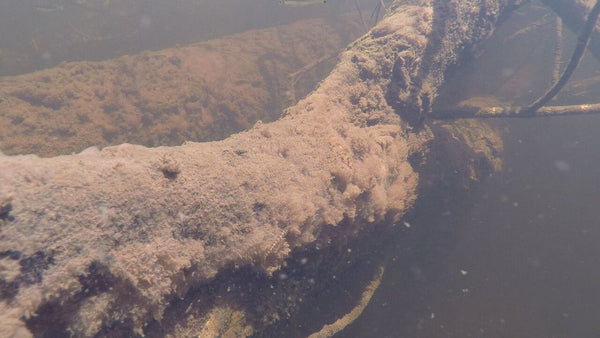- Continue Shopping
- Your Cart is Empty
Assumptions, myths, long-held beliefs...and nuisance algae.
Well, yesterday's piece on overcoming our fear of water chemistry seems to have struck resounding chord! We received a lot of comments, emails, and PM's from aquarists all over the world that were incredibly positive, and many were "confessions" (LOL, seriously) from long-time hobbyists who also candidly admitted their fear of chemistry- and their desire to overcome it! Super cool!

Reader Joshua Morgan told me that he felt I haven't touched on one of the more interesting "benefits" of a blackwater aquarium that many of us have experienced: The fact that the occurrence of nuisance algae outbreaks seem to be relatively rare in these systems. And he's correct, this is an interesting topic that I have briefly touched on, but never really went into detail about.
And it's controversial, too! Nice.

While it would be intellectually dishonest (and just plain untrue) for me to assert that blackwater/botanical aquariums aren't susceptible to algae outbreaks, it is sort of remarkable that we simply don't have massive algae issues in these types of aquarium on a regular basis. I have to admit, that I have never had one of those nightmare algal blooms in a blackwater aquarium...and although it sounds like tannins or some other "substances" in the blackwater would be the obvious "x factor", I'll tell you that I've never had an outbreak in a clearwater aquarium, either. So, from personal standpoint, I can shout, "My blackwater tanks don't have algae issues!" On the other had, none of my other tanks have had them, either. And I'll wager that neither have any of Josh's, as well!
Damn.
I read a study from the University of Georgia, which tested the idea of algae growth in blackwater streams, to determine if the limiting factor was chemical (nutrient) or light driven...and lo and behold, the study concluded that it wasn't necessarily some magic stuff in tannins and blackwater, as much as it was light limitation! Light-limiting effects of the blackwater itself were discovered to inhibit algal growth in coastal plain streams. As light penetrates the water, high DOC concentrations and suspended solids can scatter and absorb light, impacting algal growth significantly.

Okay, sounds like a bummer if you want to believe blackwater is "magic", but the study also concluded that blackwater systems were somewhat nutrient-limited, which also affected the growth of algae- although this was not concluded to be the primary factor which inhibited algae growth. In fact, another study I perused about the Rio Negro concluded that it was found that there is a relatively small difference in "respiration rates" between "whitewater" and "blackwater" rivers, and that the presumption that blackwater systems are more "sterile" is sort of overstated. Interestingly, the study also concluded that higher incidence of algal growth occurred in areas in Amazonia where water movement was minimal, or even stagnant, suggesting that, all things being equal, light limitation and water movement are possibly more significant than just higher nutrient concentrations alone!

And that makes sense, if you consider the long-held belief within the aquarium hobby that most plants don't do well in blackwater aquariums "because they don't get enough light!"
Yikes!
So the long-held aquarium attitude about blackwater having some algal-inhibiting properties is really based on the fact that it's...darker? I mean, every blackwater tank I have ever owned does have some algae present. Although, being a reef guy at heart, every aquarium I own has good water movement. I know that in leaf-litter-dominated aquariums, which I love, I still keep a good amount of flow going. This is interesting, because you'd think a tank dominated by decomposing leaf litter would be an algae farm, right? And yet, I've experienced no more occurrence of algae in the leaf litter tanks than I have in other setups. On the other hand, regardless of what type of system I work with, I'm fanatical about husbandry and nutrient control/export...obviously, another key factor.
Interesting stuff, huh? And since a lot of blackwater/botanical-style tanks are hardscape, with little or no plants, the lighting we are employing is strictly aesthetic, right? So, you're not hitting a tank with decomposing pods and no plants with 14 hours of full spectrum light...Well, that certainly can be part of the reason why this tank magically has essentially little to no nuisance algae, huh? We pin both the praise and the blame for algae on the wrong suspects, I think!
Man, this deserves more study...a lot of it.

And with more and more hobbyists playing with planted blackwater tanks, we'll have a greater "body of work" from which to draw. For that matter, more botanical, blackwater tanks in general means more material to analyze!

An here is another thing: As we've beaten into your head relentlessly, in our truly "natural style" tanks, we don't really care if there is some algae in there. We've made that "mental shift" that says it's okay to have some decomposing botanicals, brown water, biofilms, and yeah...algae. Because natural habitats do, too. So it's not so bad, right?

Let's think about algae in the aquarium to begin with...No, not the boring old "This is how algae problems happen in our aquariums..." lecture that you've read on every website known to man since the internet sprung to life. You can find that stuff everywhere. Rather, let's think about how we, as a group, mentally are opposed to the stuff in our tanks. I mean, yeah, I know of no one that really enjoys a tank smothered in algae. It looks like crap, and is a "trophy" for incompetence, in the eyes of most aquarists. In fact, I remember reading once that more people quite the aquarium hobby over algae problems than almost anything else. Yuck!

Well, sure- algae problems caused by obvious lapses in care or attention to normal maintenance, like overfeeding, lack of water changes, gross overstocking, etc. are signs of...incompetence. The occasional algae outbreaks that many hobbyists suffer through have all sorts of other potential causes, and can often be traced to a combination of small things that went unchecked, and are typically controlled in a relatively short amount of time once the causative factors are identified.
Yet, as a group, us hobbyists freak out about algae in our tanks. I can show you a hundred pics of algae in the Amazon and the Rio Negro and say, "See it happens here too! Natural!" and the typical hobbyist will still be rendered speechless with horror.

And I can't even tell you what it would do to one of those "natural aquascaping" contest freaks or judges! People might die. You could be charged as an accessory to murder!
So, not everyone gets it. Just like brown water.

Algae is the foundation of life, blah, blah, blah. Yet, it's also the foundation for a "cottage industry" of devices, chemicals, and treatment regimens designed to eradicate it.
So, the roundabout conclusion here is that:
1) Although there are many beneficial substances in blackwater, such as humic substances, tannins, etc., it's inconclusive if they alone are the reason (or even part of the reason) why we seem to have less incidence of algae in our blackwater aquariums. Some research suggests otherwise.
2) The light penetration limitation imposed by blackwater definitely has been shown to decrease algal growth.
Yeah, we have a lot of work to do.
Stay engaged. Stay excited. Stay relentless. Stay open-minded.
And Stay Wet.
Scott Fellman
Tannin Aquatics
2 Responses
SCOTT FELLMAN
HI Mack,
Yeah, we’ve used oak leaves for many years without any issues whatsoever. In fact, these are definitely our fave leaves to use in botanical-method aquariums!
Scott
Mack
Very Interesting. I was researching because I live on a lake which develops allot of algae in the summer; especially on my west-end which is shallow and without any trees. I was thinking of planting Spanish Oak/Swamp Oak, but some articles stated that the tannins in oak leaves may hurt fish (notice MAY). From reading this, believe that oak leaves will be beneficial in decreasing the algae and can co-exist with the fish. I mean 2 oak trees can’t be that harmful to the entire lake (@80 acres). Thanks









Scott Fellman
Author